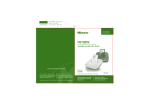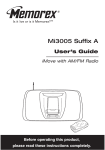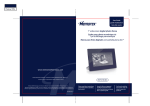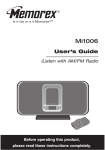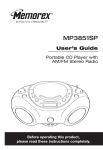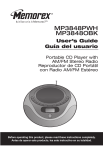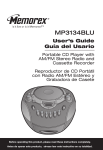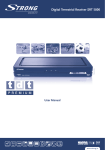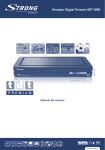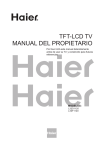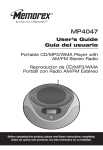Download Memorex Mi3001 Portable Speaker User Manual
Transcript
K09-00450-01 SAFETY PRECAUTIONS CAUTION RISK OF ELECTRIC SHOCK DO NOT OPEN CAUTION: TO REDUCE THE RISK OF ELECTRIC SHOCK, DO NOT REMOVE COVER (OR BACK). NO USERSERVICEABLE PARTS INSIDE. REFER SERVICING TO QUALIFIED SERVICE PERSONNEL. DANGEROUS VOLTAGE: The lightning flash with arrowhead symbol within an equilateral triangle is intended to alert the user to the presence of uninsulated dangerous voltage within the product’s enclosure that may be of sufficient magnitude to constitute a risk of electric shock to persons. ATTENTION: The exclamation point within an equilateral triangle is intended to alert the user to the presence of important operating and maintenance (servicing) instructions in the literature accompanying the appliance. FCC WARNING: This equipment may generate or use radio frequency energy. Changes or modifications to this equipment may cause harmful interference unless the modifications are expressly approved in the instruction manual. The user could lose the authority to operate this equipment if an unauthorized change or modification is made. ATTENTION: POUR ÉVITER LES CHOC ÉLECTRIQUES, INTRODUIRE LA LAME LA PLUS LARGE DE LA FICHE DANS LA BORNE CORRESPONDANTE DE LA PRISES ET POUSSER JUSQU’AU FOND. iPod is a trademark of Apple Computer, Inc., registered in the U.S. and other countries. 1 SAFETY PRECAUTIONS INFORMATION: This equipment complies with Class B digital device regulations. This equipment generates, uses and can radiate radio frequency energy and, if not installed and used in accordance with the instructions, may cause harmful interference to radio communications. However, there is no guarantee that interference will not occur in a particular installation. If this equipment does cause harmful interference to radio or television reception, which can be determined by turning the equipment off and on, the user is encouraged to try to correct the interference by one or more of the following measures: • Reorient or relocate the receiving antenna. • Increase the separation between the equipment and receiver. • Connect the equipment into an outlet on a circuit different from that to which the receiver is connected. • Consult the dealer or an experienced radio/TV technician for help. WARNING: TO PREVENT FIRE OR SHOCK HAZARD, DO NOT EXPOSE THIS UNIT TO RAIN OR MOISTURE. SURGE PROTECTORS: It is recommended to use a surge protector for AC connection. Lightning and power surges ARE NOT covered under warranty for this product. This Class B digital apparatus complies with Canadian ICES-003. Cet appareil numérique de la classe B est conforme à la norme NMB-003 du Canada. 2 LOCATION OF CONTROLS 13 14 15 16 17 18 1 2 3 4 5 6 7 19 8 9 20 21 10 11 12 1. 2. 3. 4. 5. 6. 7. 8. 9. 10. 11. 12. 13. 14. 15. 22 23 VOLUME Up/Down Buttons Display SET Button FM Antenna PRESET Button OPEN Button Remote Sensor iPod Adjustment Knob Left Speaker Left Battery Compartment (Bottom of Unit) Left Unit “Leg” (Bottom of Unit) iPod Compartment with Connector & Interchangeable Universal Docks TUNE Up/Down/ Skip n / o Buttons PLAY/PAUSE (®p) Button BASS Button 16. 17. 18. 19. 20. 21. Power Button Headphones Jack MODE Button “Grooves” for nano adapter Right Speaker LINE IN, A/V OUT & DC IN Jacks (Rear of Unit) (LINE IN CABLE PART NO. E12-00998-01, A/V CABLE PART NO. E12-00992-01, AC ADAPTER PART NO. E18-00418-01*) 22. Right Battery Compartment (Bottom of Unit) 23. Right Unit “Leg” (Bottom of Unit) *Consumer Replaceable Part 3 (See page 17 to order.) LOCATION OF CONTROLS (CONTINUED) REMOTE 1. Battery Compartment (Side of Unit) 2. TUNE Down/Skip o Button 3. VOLUME Down Button 4. MODE Button 5. VOLUME Up Button 6. BASS Button 7. POWER/PLAY/PAUSE (®p) Button 8. TUNE Up/Skip n Button 9. Belt Clip REMOTE CONTROL PART NO. A -0MI 3000-02* *Consumer Replaceable Part (See page 17 to order.) NOTES: • When the unit is on, press and hold the POWER/PLAY/PAUSE (®p) button on the remote for five seconds, the display will turn off and the unit will be in Standby mode. Within five minutes, press any button on the main unit or the remote to activate the unit again. If there is no signal input for five minutes in Standby mode, the unit will turn off. • For the Belt Clip, simply clip it to a non-slip location such as your belt, purse or backpack. 4 REMOTE CONTROL REMOTE BATTERY INSTALLATION 1. 2. 3. Remove the Battery Compartment by pressing in on the tab and then sliding the compartment out. Install a CR2025 battery, by popping it in through the back of the compartment, paying attention to the polarity diagram in the compartment (positive side up). Replace the Battery Compartment. BATTERY PRECAUTIONS Follow these precautions when using a battery in this device: 1. Use only the size and type of battery specified. 2. Be sure to follow the correct polarity when installing the battery as indicated in the Battery Compartment. A reversed battery may cause damage to the device. 3. If the device is not to be used for a long period of time, remove the battery to prevent damage or injury from possible battery leakage. 4. Do not try to recharge a battery not intended to be recharged; it can overheat and rupture. (Follow battery manufacturer’s directions.) EFFECTIVE DISTANCE OF THE REMOTE CONTROL TRANSMITTER NOTES: • When there is an obstacle between the unit and the transmitter, the transmitter may not operate. • When direct sunlight, an incandescent lamp, fluorescent lamp or any other strong light shines on the Remote Sensor of the unit, the remote operation may be unstable. 20ft 30 30 5 POWER SOURCE AC CONNECTION Insert the small end of the AC adapter into the DC IN jack (located on the rear of the unit). Connect the other end to a wall outlet having 120V AC, 60 Hz. NOTES: • Only use the supplied AC adapter which has the following specs: DC 9V Z • Remove both the DC plug and the AC-IN plug to disconnect the AC adapter when not using. • The batteries are automatically disconnected when the AC adapter is used. BATTERY INSTALLATION To use this unit with battery power, open the left and right Battery Compartment doors on the bottom of the unit by sliding them out. Insert six (6) “AA” size batteries following the illustration, and close the Battery Compartment doors. Left Battery Compartment Left Battery Compartment Right Battery Compartment Right Battery Compartment NOTE: The AC adapter must be disconnected from the DC IN jack on the rear of the unit in order for the unit to operate on battery power. 1. 2. 3. 4. 5. BATTERY PRECAUTIONS Follow these precautions when using batteries in this device: Use only the size and type of batteries specified. Be sure to follow the correct polarity when installing the batteries as indicated in the battery compartment. Reversed batteries may cause damage to the device. Do not mix different types of batteries together (e.g. Alkaline, Rechargeable and Carbonzinc) or old batteries with fresh ones. If the device is not to be used for a long period of time, remove the batteries to prevent damage or injury from possible battery leakage. Do not try to recharge batteries not intended to be recharged; they can overheat and rupture. (Follow battery manufacturer’s directions.) 6 OPTIONAL CONNECTIONS A/V (Audio/Video) OUT JACK (REAR OF UNIT) If you are using an iPod with video (5th generation) or iPod photo, you can connect this unit to an external TV with the included audio/video cable. You will then be able to view the photos (in Slideshow mode)/videos, and hear the audio, from the iPod on your external TV. NOTES: • Set the TV’s TV/VIDEO button or switch to the VIDEO setting. • When connecting this unit, refer to the owner’s manual of the TV, as well as this manual. • When connecting this unit to the TV, make sure the power is off and both units are unplugged before making any connections. • Make sure to go into the Settings menu of your iPod and set the TV Out setting to ON and set the TV signal to NTSC; otherwise, you may not be able to view the photos (in Slideshow mode)/videos on your external TV. LINE IN JACK (REAR OF UNIT) Insert one end of the audio cable (included) into the LINE OUT jack on your external audio unit and the other end into the LINE IN jack on the rear of this unit. To listen to the external audio unit, press the MODE button to select “L-IN” (Line In) mode. The external audio unit’s output sound will be heard through this unit's speakers. Adjust the volume and the BASS button as shown on page 10. It is suggested that you unplug the audio cable when you are not listening to the external audio unit. AUTO POWER OFF If there is no signal input, and no controls are used, for five minutes, this unit will automatically turn off. HEADPHONES JACK For private listening, connect 3.5mm (32 ohm) stereo headphones (not included) to this jack. The speakers are automatically disconnected when the headphone plug is inserted in the jack. LEFT & RIGHT UNIT “LEGS” (BOTTOM OF UNIT) Fully extend the Left and Right Unit “Legs” upward and outward to create a stand for your unit. 7 INSERTING AN iPod 1 2 2 1 make sure two tabs are facing front and slip dock into place Locate the correct iPod universal dock to use as shown on pages 13-14. Insert the universal dock into the compartment by making sure the two tabs are facing front and slipping the universal dock into place (as shown). Rotate the iPod Adjustment Knob 1 to the number that corresponds to your iPod (see chart on page 15). Press the OPEN button 2 to open the iPod compartment. 3 4 To remove the iPod and universal dock from this unit, make certain to remove the iPod from the connector first. Then remove the universal dock from the compartment. Insert the iPod into the compartment. Gently push down so the connector on the iPod slides onto the connector on this unit. Close the compartment by gently pushing the door back until both sides click into place. If this unit is turned on and in TUNER/LINE IN mode, once the iPod is connected, it will change to iPod mode automatically. When the iPod is connected to this unit, it will be in the Pause mode. NOTES: • CHARGING: When the iPod is inserted into the compartment and the unit is operating on AC power, whether this unit is on or off, the iPod’s battery will charge until it is full. CHANGING THE MODE: You can press the MODE button repeatedly to select between • iPod/TUNER/LINE IN mode as desired. To turn off the unit, press and hold the Power button. 8 OPERATION USING AN iPod WITH THIS UNIT 1 2 Operate the iPod as per its owner’s manual and the sound will be1 heard through this unit’s speakers, or you can use this unit’s controls to play, pause, skip or search on the iPod (see Steps 3 and 4 below). With an iPod connected (see previous page), turn this unit on by pressing the Power button (if it is not on already); "iPod" will appear in the display. NOTE: If the unit is in a mode other than iPod mode, press the MODE button to select iPod mode. 3 4 1 2 To skip forward or backward on the iPod: Press the Tune Up/Skip n 1 or Down/Skip o 2 button to skip to the next track or the beginning of the current 1 track/previous track. To search forward or backward on the iPod: Press and hold the Tune Up/Skip n 1 or Down/Skip o 2 button to search within the currentlyplaying track. To play/pause the iPod: Press the Play/Pause (®p) button to start playback on your iPod. Press again to pause playback and press yet again to resume playback. NOTES: • See the next page for how to adjust the volume. • To turn this unit off, press and hold the Power button. • If there is no signal input, and no controls are used, for five minutes, this unit will automatically turn off. • If the iPod is inserted and the unit is in TUNER/LINE IN mode before turning off, the unit will change to iPod mode when it is turned on again. 9 OPERATION (CONTINUED) ADJUSTING THE VOLUME CONTROLS 1 2 To adjust the main volume: Press the VOLUME Up and/or Down button to increase and/or decrease the volume. To adjust the bass: Press the BASS button to enhance the bass; “bass” will appear briefly in the display. Press again to resume normal bass. 10 OPERATION (CONTINUED) USING THE RADIO 1 2 Turn this unit on by pressing the Power button. 3 2 1 Repeatedly press the Tune Up/Skip n 1 or Down/Skip o 2 button to manually advance the frequency in the display up or down until the desired frequency appears. For auto tuning, press and hold the Tune Up/Skip n 1 or Down/Skip o 2 button until the frequency in the display starts to scan and then release; the tuner will search and then stop on the next strong station it finds. Repeat this step until the desired frequency appears in the display. Press the MODE button to select Tuner mode. NOTES: • • See the previous page for how to adjust the volume and bass. To turn this unit off, press and hold the Power button. Hint for Better Reception FM–Extend the FM antenna for best FM reception. 11 OPERATION (CONTINUED) SETTING THE RADIO PRESETS (20 for FM) 1 2 Follow Steps 1-3 on the previous page to tune a station. Press the SET button; “MEMO” will appear and “1” (if no presets have ever been set), will blink in the display. 2 1 1 Press the TUNE Up/Down/Skip n / o buttons 1 to select a desired Preset (1-20). Press the SET button 2 again to confirm, the station will be saved into memory. Repeat to program up to 20 Presets, as desired. RETRIEVING RADIO PRESETS (20 for FM) 1 2 Follow Steps 1-2 on the previous page to turn the unit on and select Tuner mode. Press the PRESET button 1, followed by the TUNE Up/Down/ Skip n / o buttons 2 until the desired Preset number appears in the display. 1 2 2 NOTE: The preset memories will be saved for a few minutes, if the unit is without power (no batteries/AC adapter isn't connected/power failure); but, the preset memories will be erased if the unit is without power (no batteries/AC adapter isn't connected/power failure) for a long period of time. 12 OPERATION (CONTINUED) iPod Universal Dock Locate your iPod in the chart on the next two pages and select the respective universal dock to match with your iPod. Insert the corresponding universal dock and your iPod into the unit as described on page 8. iPod Type Memory Univ. Dock No. Fourth Generation iPod 20GB/ U2 Special Edition 20GB No. 4 20GB, 30GB, U2 Special Edition No. 6 4 to 6GB iPod mini 40GB iPod Photo/ iPod with color display 40 to 60GB No. 3 No. 5 No. 7 NOTE: For the above iPod models, please use your iPod universal dock adapters (No. 3–No. 7). 13 iPod OPERATION (CONTINUED) Type First Generation iPod nano Fifth Generation iPod (w/video) Second Generation iPod nano Memory 1 to 4GB Univ. Dock No. No. 8 (Part No. P0500536-01*) 30GB No. 9 60GB/ 80GB No. 10 2 to 8GB No. 11 (Part No. P0500537-01*) (Part No. P0500538-01*) (Part No. P0500539-01*) *Consumer Replaceable Part (See page 17 to order.) NOTE: The 4 holders (No. 8–No. 11) provided with this unit are Universal Docks. IMPORTANT! The universal dock no. is marked at the bottom of the provided universal docks. Please refer to the illustration below for the location of the universal dock number. 14 OPERATION (CONTINUED) iPod ADJUSTMENT KNOB Before inserting your iPod into this unit (see page 8 for detailed instructions), you must first rotate the point of the iPod Adjustment Knob (Part No. P09-00126-01*) to the number that corresponds to your iPod (see below). 3 . . . . . . . . . . . . . . . . . . . . . . . . . . . . . . . . . . . . . . . . . . iPod mini (4-6GB) 4 . . . . . . . . . . . . . . . . . . . . . . . . . . . . . . . . . . 4th Generation iPod (20GB) 5 . . . . . . . . . . . . . . . . . . . . . . . . . . . . . . . . . . 4th Generation iPod (40GB) 6 . . . . . . . . . . . . . . . . . . . . iPod photo/iPod with color display (20-30GB) 7 . . . . . . . . . . . . . . . . . . . . iPod photo/iPod with color display (40-60GB) 9 . . . . . . . . . . . . . . . . . . . . . . . . . . . . . . . . . . 5th Generation iPod (30GB) 10 . . . . . . . . . . . . . . . . . . . . . . . . . . . . . . 5th Generation iPod (60/80GB) NOTE: • For the 1st and 2nd Generation iPod nano, insert the included “nano adapter” (shown below [Part No. P07-00294-01*]) into the compartment by aligning the two pegs on the “nano adapter” with the two grooves in the compartment before inserting the iPod nano as described on page 8. TOP BOTTOM *Consumer Replaceable Part (See page 17 to order.) 15 TROUBLESHOOTING GUIDE If you experience a problem with this unit, check the chart below before calling for service. SYMPTOM CAUSE FM, no sound. Power is not on. No sound. SOLUTION Volume is set to minimum. set to minimum. Station is not tuned iPod mode, not charging battery. then the MODE button to Increase volume. Retune the FM properly. broadcast station. FM: Telescopic Reorient FM telescopic antenna is not antenna. Incorrectly connected. Check the connection. properly adjusted. iPod mode, no sound. Press the Power button, select Tuner. Volume is FM, poor sound. Increase volume. Not in iPod mode. Not using AC adapter. 16 Press the MODE button to select iPod mode. Must use AC adapter. SPECIFICATIONS GENERAL: Power Source .............DC 9V (6 x 1.5V ‘AA’ size batteries) ...............................Alkaline is recommended for longer life .....................................DC IN 9V Adapter (Center Positive) Speaker...............................................................4 x 4 ohms Output Power ..................................2 x 4W (using adapter) RADIO SECTION: Frequency Range (FM) ................................87.5–108 MHz Specifications are subject to change without notice. FOR ADDITIONAL SET-UP OR OPERATING ASSISTANCE, PLEASE VISIT OUR WEBSITE AT: WWW.MEMOREXELECTRONICS.COM OR CONTACT CUSTOMER SERVICE AT (954) 660-7100. PLEASE KEEP ALL PACKAGING MATERIAL FOR AT LEAST 90 DAYS IN CASE YOU NEED TO RETURN THIS PRODUCT TO YOUR PLACE OF PURCHASE OR MEMOREX. FOR CONSUMER REPLACEABLE PART(S), SEE PART NUMBER(S) ON PAGES 3-4 AND 14-15 AND THEN CONTACT FOX INTERNATIONAL AT 1-800-321-6993. 17 MEDIDAS DE SEGURIDAD CUIDADO RIESGO DE DESCARGA ELÉCTRICA. NO ABRIR ADVERTENCIA: Para reducir el riesgo de descargas eléctricas no abra la cubierta o tapa posterior. Allí no hay partes que el usuario pueda reparar. Lleve su unidad a un Centro de Servicio Autorizado. ADVERTENCIA: La figura del rayo con punta de flecha dentro de un triángulo está hecha para alertar al usuario de la presencia de cables sin aislar con “voltaje peligroso” dentro del gabinete, de tal magnitud que puede ocasionar una descarga eléctrica a las personas. ADVERTENCIA: El signo de exclamación dentro de un triángulo está hecho para alertar al usuario de la existencia de instrucciones importantes tanto de servicio como de funcionamiento y mantenimiento que vienen con la unidad. AVISO DE LA FCC: Este equipo genera o puede usar energía de frecuencia radial. Cualquier cambio o modificación al equipo puede causar interferencia nociva, a menos que estas modificaciones estén expresamente indicadas en el manual de instrucciones. El usuario puede perder el derecho de operar este equipo si efectuara un cambio o modificación no autorizados. ATTENTION: POUR ÉVITER LES CHOC ÉLECTRIQUES, INTRODUIRE LA LAME LA PLUS LARGE DE LA FICHE DANS LA BORNE CORRESPONDANTE DE LA PRISES ET POUSSER JUSQU’AU FOND. iPod es una marca comercial de Apple Computer, Inc., registrada en los Estados Unidos y en otros países. 1 MEDIDAS DE SEGURIDAD INFORMACIÓN: Este equipo cumple con los reglamentos de un aparato digital de Clase B. Este equipo genera, usa y puede irradiar energía de radiofrecuencia y, si no se instala y usa conforme a las instrucciones, puede generar interferencia dañina con las radiocomunicaciones. Sin embargo, no hay garantía de que no habrá interferencia en una instalación particular. Si este equipo llegara a causar interferencia dañina con la recepción de radio o televisión, lo cual se puede determinar encendiendo y apagando el equipo, le pedimos que intente corregir la interferencia con las siguientes medidas: • Cambie la orientación o ubicación de la antena receptora. • Incremente la distancia entre el equipo y el receptor. • Conecte el equipo a un contacto eléctrico que esté en un circuito distinto al que está conectado el receptor. • Consulte al vendedor o a un técnico de radio y televisión con experiencia. ADVERTENCIA: PARA EVITAR LOS RIESGOS DE DESCARGA ELÉCTRICA O INCENDIO, NO EXPONGA ESTE APARATO A LA LLUVIA NI A LA HUMEDAD. PROTECTORES DE VOLTAJE: Se recomienda utilizar un protector de voltaje para la conexión a corriente eléctrica. Los daños ocasionados por relámpagos y picos de voltaje no están cubiertos por la garantía de este producto. Este aparato digital de Clase B cumple con la norma ICES-003 de Canadá. Cet appareil numérique de la classe B est conforme à la norme NMB-003 du Canada. 2 UBICACIÓN DE LOS CONTROLES 13 14 15 16 17 18 1 2 3 4 5 6 7 19 8 9 20 21 22 23 10 11 12 1. Botones de Subir/Bajar VOLUMEN 2. Display 3. Botón de AJUSTE 4. Antena FM 5. Botón de PREDEFINIR 6. Botón de ABRIR 7. Sensor del remoto 8. Perilla de ajuste del iPod 9. Bocina izquierda 10. Compartimiento de batería izquierdo (parte inferior de la unidad) 11. “Pata” izquierda de la unidad (parte inferior de la unidad) 12. Compartimiento de iPod con conector y puertos universales intercambiables 13. Botones de SINTONIZAR Arriba/Abajo/Brincar n / o 14. Botón de REPRODUCIR/PAUSA (®p) 15. Botón de GRAVES 16. Botón de encendido 17. Enchufe de audífonos 18. Botón de MODO 19. “Ranuras” para adaptador de iPod nano 20. Bocina derecha 21. Conectores de entrada de línea, salida de A/V y entrada de CD (atrás en la unidad) (CABLE DE ENTRADA DE LÍNEA, NO. DE PIEZA E12-00998-01; CABLE A/V, NO. DE PIEZA E1200992-01; ADAPTADOR DE CANO. DE PIEZA E18-00418-01*) 22. Compartimiento de batería derecho (parte inferior de la unidad) 23. “Pata” derecha de la unidad (parte inferior de la unidad) *Pieza reemplazable por el consumidor (Ver página 17 para realizar un pedido.) 3 UBICACIÓN DE LOS CONTROLES (CONTINÚA) CONTROL REMOTO 1. Compartimiento de baterías (costado de unidad) 2. Botón de Sintonizar Abajo/ Brincar o 3. Botón de Bajar volumen 4. Botón de Modo 5. Botón de Subir volumen 6. Botón de GRAVES 7. Botón de Encendido/ Reproducir/Pausa (®p) 8. Botón de Sintonizar Arriba/ Brincar n 9. Clip para cinturón CONTROL REMOTO, NO. DE PIEZA: A-0MI3000-02* *Pieza reemplazable por el consumidor (Ver página 17 para realizar un pedido.) NOTAS: • Cuando la unidad está encendida, presione el botón de ENCENDIDO/REPRODUCIR/PAUSA (®p) y manténgalo presionado en el control remoto durante cinco segundos; el display se apagará y la unidad estará en modo de Espera. En menos de cinco minutos, presione cualquier botón en la unidad principal o en el control remoto para activar la unidad nuevamente. Si no hay una señal de entrada durante cinco segundos en modo de Espera, la unidad se apagará. • Para el clip de cinturón, simplemente sujételo en un lugar donde no se pueda deslizar como por ejemplo su cinturón, una bolsa o mochila. 4 CONTROL REMOTO INSTALACIÓN DE LAS BATERÍAS EN EL CONTROL REMOTO 1. 2. 3. Quite la puerta del compartimiento ejerciendo presión en la pestaña y deslizándola. Instale una batería CR2025, metiéndola por la parte posterior del compartimiento, prestando atención al diagrama de polaridad en el compartimiento (lado positivo hacia arriba). Coloque nuevamente el compartimiento de baterías. CUIDADO DE LAS BATERÍAS Cuando use baterías, tome las siguientes precauciones: 1. Use únicamente el tamaño de batería que indica el fabricante. 2. Asegúrese de seguir la polaridad indicada en el compartimiento cuando instale su batería. De no hacerlo, usted puede dañar su unidad. 3. Si no va a usar su unidad por un largo período de tiempo, saque la batería para evitar que se oxide y se dañen las terminales. 4. Nunca intente recargar baterías que no han sido hechas para este fin, ya que pueden recalentarse y reventar. (Siga las indicaciones del fabricante de las baterías). DISTANCIA EFICAZ DEL TRANSMISOR DEL CONTROL REMOTO NOTAS: • Cuando hay un obstáculo entre la unidad y el transmisor, es posible que el transmisor no funcione. • Cuando alumbra la luz directa del sol, una lámpara incandescente, una lámpara fluorescente o cualquier otra luz fuerte sobre el SENSOR DEL REMOTO de la unidad, la operación del control remoto se vuelve instable. 20ft 30 30 5 FUENTE DE ENERGÍA CONEXIÓN A CORRIENTE ELÉCTRICA Inserte el extremo pequeño del cable para adaptador de corriente alterna en el enchufe de entrada de DC (ubicado en la parte posterior de la unidad). Conecte el otro extremo en el contacto eléctrico de 120VCA, 60 Hz. Contacto eléctrico NOTAS: Enchufe del • Use únicamente un adaptador de corriente adaptador de CA alterna incluido, que tenga las siguientes especificaciones: CD 9V Z • Cuando no vaya a utilizar la unidad, desconecte el adaptador de corriente alterna de ambos lados. • Las baterías se desconectan automáticamente al usar el adaptador de CA. INSTALACIÓN DE LAS BATERÍAS Para usar esta unidad con baterías, abra las puertas del Compartimiento de batería izquierdo y derecho en la parte inferior de la unidad deslizándolas hacia afuera. Introduzca seis (6) baterías de tamaño “AA” siguiendo la ilustración y cierre las puertas de los compartimientos. Compartimiento de izquierdo Left Battery Compartment Leftbatería Battery Compartment Compartimiento de derecho Rightbatería Battery Compartment Right Battery Compartment NOTA: El adaptador de CA debe estar desconectado del conector de entrada de CD en la parte posterior de la unidad para que la unidad pueda operar con baterías. CUIDADO DE LAS BATERÍAS Cuando use baterías, tome las siguientes precauciones: 1. Use únicamente el tamaño de batería que indica el fabricante. 2. Asegúrese de seguir la polaridad indicada en el compartimiento cuando instale su batería. De no hacerlo, usted puede dañar su unidad. 3. No mezcle tipos de batería diferentes, por ejemplo alcalinas, con Carbono de Cinc, así como tampoco debe mezclar baterías usadas con nuevas. 4. Si no va a usar su unidad por un largo período de tiempo, saque la batería para evitar que se oxide y se dañen las terminales. 5. Nunca intente recargar baterías que no han sido hechas para este fin, ya que pueden recalentarse y explotar. (Siga las indicaciones del fabricante de las baterías). 6 CONEXIONES OPCIONALES Conector de salida de A/V (Audio/Video) (ATRÁS EN LA UNIDAD) Si está usando un iPod con video (5a generación) o un iPod photo, puede conectar esta unidad a un televisor externo con el cable de audio/video incluido. Entonces podrá ver las fotos (en modo de Presentación) y los videos, y escuchar el audio, del iPod en su televisor externo. NOTAS: • Ponga el botón o interruptor de TV/VIDEO del televisor en VIDEO. • Cuando conecte la unidad, consulte el manual del propietario del televisor, así como este manual. • Cuando conecte esta unidad al televisor, cerciórese de que la energía esté apagada y que ambas unidades estén desconectadas antes de realizar la conexión. • Asegúrese de entrar al menú de Configuraciones de su iPod y activar la Salida de TV, así como ajustar la señal de televisión en NTSC; de lo contrario, no podrá ver los videos o fotos (en modo de Presentación) en su televisor externo. ENCHUFE DE ENTRADA DE LÍNEA (ATRÁS EN LA UNIDAD) Introduzca un extremo del cable de audio (incluido) en el conector de SALIDA DE LÍNEA, que está en la unidad externa de audio, y el otro extremo en el conector de ENTRADA DE LÍNEA en la parte posterior de esta unidad. Para escuchar la unidad de audio externa, presione el botón de MODO para seleccionar el modo de “L-IN” (entrada de línea). El sonido que produce la unidad de audio externa se escuchará a través de las bocinas de esta unidad. Ajuste el volumen y el botón de GRAVES como se muestra en la página 10. Sugerimos que desconecte el cable de audio cuando no vaya a escuchar la unidad de audio externa. APAGADO AUTOMÁTICO Si no hay una señal de entrada y no usa los controles durante cinco minutos, la unidad se apagará automáticamente. ENCHUFE DE AUDÍFONOS Para escuchar en privado, conecte los audífonos de 3.5mm (32 ohmios) (no incluidos) a este enchufe. Las bocinas se desconectan automáticamente al conectar los audífonos. “PATAS” IZQUIERDA Y DERECHA DE LA UNIDAD (PARTE INFERIOR DE LA UNIDAD) Extienda las patas izquierda y derecha de la unidad por completo hacia arriba y hacia afuera para crear una base para su unidad. 7 1 CÓMO INSERTAR UN iPod 2 2 1 Gire la Perilla de ajuste del iPod número que corresponde con su (vea la tabla en la página Presione el botón de ABRIR 2 abrir el compartimiento del iPod. Asegúrese de que las dos pestañas miren hacia adelante y deslice el puerto a su lugar 1 al iPod 15). para Ubique el puerto universal correcto para el iPod a ser usado como se muestra en las páginas 13 y 14. Inserte el puerto universal en el compartimiento, asegurándose de que las dos pestañas miren hacia adelante y deslice el puerto universal a su lugar (como se muestra). 3 4 Para quitar el iPod y el puerto universal de esta unidad, asegúrese de quitar primero el iPod del conector. Luego quite el puerto universal del compartimiento. Introduzca el iPod en el compartimiento. Empújelo suavemente para que el conector en el iPod se deslice por el conector en esta unidad. Cierre el compartimiento empujando suavemente la puerta hasta que ambos lados encajen en su lugar. Si la unidad está encendida y en modo de SINTONIZADOR, una vez que conecte el iPod la unidad cambiará automáticamente al modo de iPod. Cuando el iPod está conectado a esta unidad, estará en modo de Pausa. NOTAS: • CARGA: Cuando inserte el iPod en el compartimiento y la unidad opera con energía eléctrica, ya sea que la unidad esté encendida o apagada, la batería del iPod se cargará hasta estar llena. • CAMBIAR EL MODO: Puede presionar repetidamente el botón de MODO para seleccionar entre el modo iPod/SINTONIZADOR/ENTRADA DE LÍNEA, según desee. Para apagar la unidad, presione el botón de encendido y manténgalo presionado. 8 OPERACIÓN CÓMO USAR UN iPod CON ESTA UNIDAD 1 2 Opere el iPod como indica el manual del propietario y escuchará el sonido a través 1 de las bocinas de esta unidad, o puede usar los controles de esta unidad para reproducir, pausar, brincar o buscar en el iPod (vea los pasos 3 y 4 a continuación). Con el iPod conectado (ver página previa), encienda la unidad presionando el botón de encendido (si no lo ha hecho); “iPod” aparecerá en el display. NOTA: Si la unidad está en modo diferente al modo de iPod, presione el botón de MODO para seleccionar el modo de iPod. 3 4 1 2 Para brincar hacia adelante o atrás en el iPod: Presione el botón de Sintonizar Arriba/Brincar n 1 o Abajo/Brincar o 2 para brincar a la siguiente pista o al inicio de la1pista actual o anterior. Para buscar hacia adelante o atrás en el iPod: Presione el botón de Sintonizar Arriba/Brincar n 1 o Abajo/Brincar o 2 y manténgalo presionado para buscar dentro de la pista actual. Para reproducir y pausar el iPod: Presione el botón de Reproducir/ Pausa (®p) para empezar la reproducción del iPod. Presione dicho botón nuevamente para pausar la reproducción y presiónelo una vez más para reanudar la reproducción. NOTAS: • Vea la siguiente página en cuanto a cómo ajustar el volumen. • Para apagar la unidad, presione el botón de Encendido y manténgalo presionado. • Si no hay una señal de entrada y no usa los controles durante cinco minutos, la unidad se apagará automáticamente. • Si inserta el iPod y la unidad estaba en modo de SINTONIZAR/ENTRADA DE LÍNEA antes de apagarla, la unidad cambiar al modo de iPod cuando la encienda nuevamente. 9 OPERACIÓN (CONTINÚA) CÓMO AJUSTAR LOS CONTROLES DE VOLUMEN 1 2 Para ajustar el volumen principal: Presione el botón de Subir/Bajar VOLUMEN para subir o bajar el volumen. Para ajustar los bajos: Presione el botón de GRAVES para mejorar el sonido de los graves; "bass" [graves] aparecerá brevemente en el display. Presiónelo de nuevo para reanudar los graves normales. 10 OPERACIÓN (CONTINÚA) CÓMO USAR LA RADIO 1 2 Encienda esta unidad presionando el botón de Encendido. 3 2 1 Presione repetidamente el botón de Sintonizar Arriba/Brincar n 1 o Abajo/ Brincar o 2 para avanzar manualmente la frecuencia en el display hacia arriba o abajo, hasta que aparezca la frecuencia deseada. Para la sintonización automática, presione el botón de Sintonizar Arriba/Brincar n 1 o Arriba/Brincar o y manténgalo presionado hasta que la frecuencia en el display empiece a buscar y luego suéltelo; el sintonizador buscará y se detendrá en la siguiente estación fuerte que encuentre. Repita ese paso hasta que aparezca la frecuencia deseada en el display. Presione el botón de MODO para seleccionar el modo de Sintonizador. NOTAS: • • Vea la página anterior en cuanto a cómo ajustar el volumen y los graves. Para apagar la unidad, presione el botón de Encendido y manténgalo presionado. Consejos para una mejor recepción FM: Extienda el cable de la antena FM para una mejor recepción de FM. 11 OPERACIÓN (CONTINÚA) CONFIGURAR PREDEFINIDOS DE LA RADIO (20 para FM) 1 2 Siga los pasos 1 a 3 en la página anterior para sintonizar una estación. Presione el botón de AJUSTE; “MEMO” aparecerá y “1” (si nunca ha configurado los predefinidos) parpadeará en el display. 2 1 1 Presione los botones de SINTONIZAR Arriba/Abajo/Brincar n / o 1 para seleccionar el Predefinido deseado (1-20). Presione nuevamente el botón de AJUSTE 2 para confirmar; la estación quedará guardada en la memoria. Repita lo anterior para programar hasta 20 predefinidos, según desee. RECUPERAR LOS PREDEFINIDOS DE LA RADIO (20 para FM) 1 2 Siga los pasos 1-2 en la página anterior para encender la unidad y seleccione el modo de Sintonizador. Presione el botón de PREDEFINIDO 1, seguido de los botones de SINTONIZAR Arriba/ Abajo/Brincar n / o 2 hasta que el número de Predefinido deseado aparezca en el display. 1 2 2 NOTA: Las memorias predefinidas se guardarán durante unos minutos, si la unidad no tiene corriente eléctrica (si la unidad no tiene baterías y el adaptador de CA no está conectado y/o hay un apagón); no obstante, las memorias predefinidas se borrarán si la unidad no tiene corriente eléctrica (si la unidad no tiene baterías y el adaptador de CA no está conectado y/o hay un apagón) durante un periodo extenso. 12 OPERACIÓN (CONTINÚA) PUERTOS UNIVERSALES DE iPod Ubique su iPod en la tabla en las siguientes dos páginas y seleccione el puerto universal respectivo que corresponde con su iPod. Inserte el puerto universal correspondiente así como su iPod en la unidad como se describe en la página 8. iPod Tipo Memoria N° puerto univ. 4a 6GB No. 3 Fourth Generation iPod 20GB/ U2 Special Edition 20GB No. 4 20GB, 30 GB, U2 Special Edition No. 6 iPod mini 40GB iPod Photo/ iPod con despliegue de color 40 a 60GB No. 5 No. 7 NOTA: Para los modelos de iPod anteriores, utilice los adaptadores para puerto universal del iPod (no. 3 a no. 7). 13 iPod OPERACIÓN (CONTINÚA) Tipo First Generation iPod nano Fifth Generation iPod (c/video) Second Generation iPod nano Memoria N° puerto univ. 1a 4GB No. 8 30GB No. 9 60GB / 80GB No. 10 2a 8GB No. 11 (No. de pieza P0500536-01*) (No. de pieza P0500537-01*) (No. de pieza P0500538-01*) (No. de pieza P0500539-01*) *Pieza reemplazable por el consumidor (Ver página 17 para realizar un pedido.) NOTA: Los 4 portadores (no. 8 a no. 11) suministrados con esta unidad son puertos universales. ¡IMPORTANTE! El número del puerto universal está grabado en la parte inferior de los mismos proporcionadas. Consulte la ilustración a continuación para ver la ubicación del número del puerto universal. 14 OPERACIÓN (CONTINÚA) Perilla de ajuste del iPod Antes de insertar su iPod en esta unidad (vea la página 8 en cuanto a instrucciones detalladas), primero debe girar la punta de la Perilla de ajuste del iPod (No. de pieza P09-00126-01*) al número que corresponde con su iPod (vea a continuación). 3 . . . . . . . . . . . . . . . . . . . . . . . . . . . . . . . . . . . . . . . . . . iPod mini (4-6GB) 4 . . . . . . . . . . . . . . . . . . . . . . . . . . . . . . . . . . 4th Generation iPod (20GB) 5 . . . . . . . . . . . . . . . . . . . . . . . . . . . . . . . . . . 4th Generation iPod (40GB) 6 . . . . . . . . . . . . . . . . . . . iPod photo/iPod con display a color (20-30GB) 7 . . . . . . . . . . . . . . . . . . . iPod photo/iPod con display a color (40-60GB) 9 . . . . . . . . . . . . . . . . . . . . . . . . . . . . . . . . . . 5th Generation iPod (30GB) 10 . . . . . . . . . . . . . . . . . . . . . . . . . . . . . . 5th Generation iPod (60/80GB) NOTA: • Para los iPod nano de 1a y 2a generación, inserte el “adaptador de nano” incluido (como se muestra abajo [No. de pieza P07-0029401*]) en el compartimiento, alineando las dos clavijas del “adaptador de nano” con las dos ranuras en el compartimiento antes de insertar el iPod nano como se describe en la página 8. CIMA FONDO *Pieza reemplazable por el consumidor (Ver página 17 para realizar un pedido.) 15 GUÍA DE DIAGNÓSTICO Si tiene problemas con esta unidad, revise la tabla a continuación antes de llamar a servicio. SÍNTOMA CAUSA FM, sin sonido. Energía apagada. Sin sonido. El volumen está al mínimo. luego el botón de MODO El volumen está al Sonido deficiente en FM. mínimo. Estación no sintonizada Modo de iPod: no carga la batería. Presione el botón de Encendido, para seleccionar Sintonizador. Suba el volumen. Resintonice la estación de FM. FM: La antena Cambie la antena FM ajustada correctamente. sonido. Suba el volumen. apropiadamente. telescópica no está Modo de iPod sin SOLUCIÓN Incorrectamente conectado telescópica de lugar. Revise la conexión. No en modo de iPod. Presione el botón de MODO No está usando el Debe usar el adaptador. adaptador. 16 para seleccionar iPod. ESPECIFICACIONES GENERAL: Fuente de energía ....9V CD (6 baterías 1.5V tamaño “AA”) ............Se recomiendan las alcalinas por su larga duración ...................Enchufe de entrada de 9V CD (centro positivo) Bocina. .............................................................4 x 4 ohmios Potencia de salida ...............2 x 4W (usando el adaptador) SECCIÓN DE RADIO: Rango de frecuencia (FM) ...........................87.5–108 MHz Las especificaciones están sujetas a cambios sin previo aviso. PARA OBTENER AYUDA ADICIONAL CON RESPECTO A LOS AJUSTES O LA OPERACIÓN, VISITE NUESTRO SITIO WEB EN WWW.MEMOREXELECTRONICS.COM O COMUNÍQUESE CON SERVICIO AL CLIENTE AL (954) 660-7100. CONSERVE EL EMPAQUE AL MENOS DURANTE 90 DÍAS POR SI ACASO NECESITARA REGRESAR EL PRODUCTO A SU DISTRIBUIDOR O A MEMOREX. PARA OBTENER PIEZAS REEMPLAZABLES POR EL CONSUMIDOR, CONSULTE EL NÚMERO DE PIEZA EN LAS PÁGINAS 3-4 Y 14-15 Y LUEGO COMUNÍQUESE CON FOX INTERNATIONAL AL 1-800-321-6993. 17 K09-00450-01




































